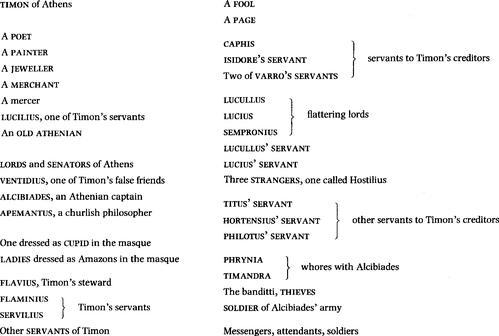Timon of Athens is an exceptionally schematic play falling into two sharply contrasting parts, the second a kind of mirror image of the first. Many of the characters are presented two-dimensionally, as if the dramatists were more concerned with the play’s pattern of ideas than with psychological realism. The overall tone is harsh and bitter; there are passages of magnificent invective along with brilliant satire, but there is also tenderness in the portrayal of Timon’s servants, especially his ‘one honest man’, Flavius. In the play’s comparatively rare performances some adaptation has usually been found necessary; but the exceptionally long role of Timon offers great opportunities to an actor who can convey his vulnerability as well as his virulence, especially in the strange music of the closing scenes which suggests in him a vision beyond the ordinary.
THE PERSONS OF THE PLAY

The Life of Timon of Athens
1.1 Enter Poet ⌈at one door⌉, Painter carrying a picture [at another door], [followed by] Jeweller, Merchant, and Mercer, at several doors
POET
Good day, sir.
PAINTER I am glad you’re well.
POET
I have not seen you long. How goes the world?
PAINTER
It wears, sir, as it grows.
POET Ay, that’s well known.
But what particular rarity, what strange,
Which manifold record not matches?—See,
Magic of bounty, all these spirits thy power
Hath conjured to attend.
⌈Merchant and Jeweller meet. Mercer passes over
the stage, and exits⌉
I know the merchant.
PAINTER
I know them both. Th’other’s a jeweller.
MERCHANT (to Jeweller)
O, ’tis a worthy lord!
JEWELLER Nay, that’s most fixed.
MERCHANT
A most incomparable man, breathed, as it were,
To an untirable and continuate goodness.
He passes.
JEWELLER (showing a jewel) I have a jewel here.
MERCHANT
O, pray, let’s see’t. For the Lord Timon, sir?
JEWELLER
If he will touch the estimate. But for that—
POET (to himself)
‘When we for recompense have praised the vile,
It stains the glory in that happy verse
Which aptly sings the good.’
MERCHANT (to Jeweller) ’Tis a good form.
JEWELLER
And rich. Here is a water, look ye.
PAINTER (to Poet)
You are rapt, sir, in some work, some dedication
To the great lord.
POET A thing slipped idly from me.
Our poesy is as a gum which oozes
From whence ‘tis nourished. The fire i’th’ flint
Shows not till it be struck; our gentle flame
Provokes itself, and like the current flies
Each bound it chafes. What have you there?
PAINTER
A picture, sir. When comes your book forth?
POET
Upon the heels of my presentment, sir.
Let’s see your piece.
PAINTER (showing the picture) ’Tis a good piece.
POET
So ’tis. This comes off well and excellent.
PAINTER
Indifferent.
POET Admirable. How this grace
Speaks his own standing! What a mental power
This eye shoots forth! How big imagination
Moves in this lip! To th’ dumbness of the gesture
One might interpret.
PAINTER
It is a pretty mocking of the life.
Here is a touch; is’t good?
POET I will say of it,
It tutors nature. Artificial strife
Lives in these touches livelier than life.
Enter certain Senators
PAINTER How this lord is followed!
POET
The senators of Athens. Happy man!
PAINTER Look, more.
⌈The Senators pass over the stage, and exeunt]
POET
You see this confluence, this great flood of visitors.
I have in this rough work shaped out a man
Whom this beneath world doth embrace and hug
With amplest entertainment. My free drift
Halts not particularly, but moves itself
In a wide sea of tax. No levelled malice
Infects one comma in the course I hold,
But flies an eagle flight, bold and forth on,
Leaving no tract behind.
PAINTER How shall I understand you?
POET I will unbolt to you.
You see how all conditions, how all minds,
As well of glib and slipp’ry creatures as
Of grave and austere quality, tender down
Their service to Lord Timon. His large fortune,
Upon his good and gracious nature hanging,
Subdues and properties to his love and tendance
All sorts of hearts; yea, from the glass-faced flatterer
To Apemantus, that few things loves better
Than to abhor himself; even he drops down
The knee before him, and returns in peace,
Most rich in Timon’s nod.
PAINTER I saw them speak together.
POET
Sir, I have upon a high and pleasant hill
Feigned Fortune to be throned. The base o’th’ mount
Is ranked with all deserts, all kind of natures
That labour on the bosom of this sphere
To propagate their states. Amongst them all
Whose eyes are on this sovereign lady fixed
One do I personate of Lord Timon’s frame,
Whom Fortune with her ivory hand wafts to her,
Whose present grace to present slaves and servants
Translates his rivals.
PAINTER ’Tis conceived to scope.
This throne, this Fortune, and this hill, methinks,
With one man beckoned from the rest below,
Bowing his head against the steepy mount
To climb his happiness, would be well expressed
In our condition.
POET Nay, sir, but hear me on.
All those which were his fellows but of late,
Some better than his value, on the moment
Follow his strides, his lobbies fill with tendance,
Rain sacrificial whisperings in his ear,